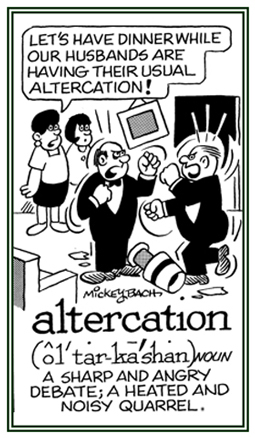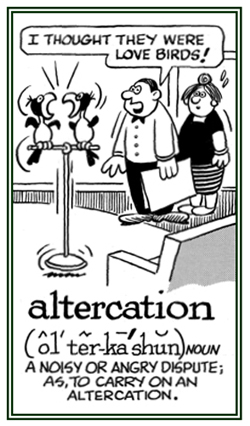-ation, -ization (-iz[e] + -ation); -isation (British spelling variation)
(Greek > Latin: a suffix; action, act, process, state, or condition; or result of doing something)
Although there are over 1,450 word entries ending with -ation or -ization listed in this unit, there are certainly many more which exist in the English language. At any rate, this unit provides a significant number of -ation and -ization examples for you to see.
Nurishment; the process of giving sustenance or support: When Susan was in hospital, Dr. Fisk ordered her to have intravenous alimentation until she could eat normal food again.
An active sensitization or the introduction of allergens into the body: Dr. Smart suggested to Joe that an allergization would help him to breathe easier in springtime when the allergen pollen would be present in the air.
Allergization describes the process of becoming sensitive to an allergen.
1. The feeling that comes when something uncomfortable or unpleasant is removed or reduced: There was an alleviation of suffering after the doctor treated Manual for his aching back.
2. The act of relieving, or the state of being less uncomfortable, oppressive, or burdensome: Joe took an aspirin as an alleviation for his headache.
2. The act of relieving, or the state of being less uncomfortable, oppressive, or burdensome: Joe took an aspirin as an alleviation for his headache.
1. A rule relating to the solution of questions concerning the compounding or mixing of different ingredients, or ingredients of different qualities or values.
2. The act of tying together or attaching by some bond, or the state of being attached.
2. The act of tying together or attaching by some bond, or the state of being attached.
Two or more words that have the same initial sound or sounds that occur in a phrase or a line: While Henry was going for a walk, he thought up a couple of examples of alliterations: a babbling brook in the wild and woody area.
A system, procedure, or process of distributing or sharing by setting something aside: The allocation of the food for the poor will be put into effect the following month.
A form of organic evolution starting from a life-giving reproduction that happens due to a change in time of breeding which lessens or stops gene flow between two groups of a species: Allochronic speciation is the process of developing different biological groups as a result of members of the population that have different breeding seasons or patterns, or differing in the use of time during the day or night, rather than through geographic separation.
Reciprocal transformation of two mutants to the wild type: An allogenic transformation takes place by the action of a transforming principle to one mutant obtained from the other one.
The replacement of lost or damaged bodily tissue with an allograft or surgical substitute of a body part from one individual to a different person: An allotransplantation includes cornea (transparent front of the eye), cartilage (rubber-like padding that covers and protects the ends of long bones at the joints), bone, arteries (vessels that carry blood away from the heart), and cadaver (dead-body) epidermis that is stored in a skin-tissue bank.
Allotransplantation involves the moving of a part from one individual into another one which are usually not related to each other.
The depositions or formations of sediments or materials that have been carried and left on land areas by running water such as rivers or streams: Alluviations are the results of sand, silt, mud, or other detritus (loose materials) left by flowing water in river beds, flood plains, lakes, etc.
alphabetization
Putting something in alphabetical order (customary order of the letters from "a" to "z").
1. The act or procedure of becoming different: Mary's mother made an alteration to her daughter's dress so it would fit properly.
2. A condition resulting from a modification: Since Lynn and her friend didn't have so much money, the made an alteration in their plans for the summer holiday, and stayed home instead of going on a cruise.
3. An event that occurs when something passes from one condition or phase to an another one: An occurrence is an alteration when something goes or proceeds from one situation to another.
2. A condition resulting from a modification: Since Lynn and her friend didn't have so much money, the made an alteration in their plans for the summer holiday, and stayed home instead of going on a cruise.
3. An event that occurs when something passes from one condition or phase to an another one: An occurrence is an alteration when something goes or proceeds from one situation to another.
1. A vehement, heated, or angry dispute: The two youths got into an altercation on the playground while they were playing soccer.
2. A noisy argument or controversy: The verbal altercation which Alex observed did not appear to be aggressive so he didn't try to intervene.
3. Etymology: from Latin altercari "to dispute (with another)"; from alter, "other".

© ALL rights are reserved.

© ALL rights are reserved.
Go to this Word A Day Revisited Index
2. A noisy argument or controversy: The verbal altercation which Alex observed did not appear to be aggressive so he didn't try to intervene.
3. Etymology: from Latin altercari "to dispute (with another)"; from alter, "other".


Go to this Word A Day Revisited Index
for a list of additional Mickey Bach illustrations.
1. A successive change from one thing or state to another and back again.
2. Repeated rotations: People expect to experience alternations of the seasons.
3. In linguistics, a variation in the form of a language as it occurs in different environments or under different conditions.
2. Repeated rotations: People expect to experience alternations of the seasons.
3. In linguistics, a variation in the form of a language as it occurs in different environments or under different conditions.
1. An activity, process, or result of combining or uniting something: There has been an amalgamation of the two competing companies into one organization.
2. The mixing of mercury with another metal, or metals, to form an alloy: The jewelry manufacturer used an amalgamation of silver and stronger metals to create a design that was both durable and beautiful.
3. The process for the separation of metal from a base ore using such a chemical as mercury: The mine engineer explained that the amalgamation of gold was a complicated chemical process.
2. The mixing of mercury with another metal, or metals, to form an alloy: The jewelry manufacturer used an amalgamation of silver and stronger metals to create a design that was both durable and beautiful.
3. The process for the separation of metal from a base ore using such a chemical as mercury: The mine engineer explained that the amalgamation of gold was a complicated chemical process.


